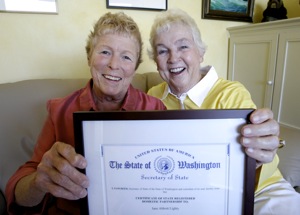-
- State assemblymember stopped from bringing gun to Capitol
- Hate crimes hit five year high in L.A. County
- Villaraigosa pulls out of SF gay rights event
- Washington domestic partnership law hits one-year mark
- Transgender woman claims she was wrongly fired
- Ethics complaint filed against legislator
- National News Briefs
- World News Briefs
national
Washington domestic partnership law hits one-year mark
More than 4,200 couples registered since last July
Published Thursday, 31-Jul-2008 in issue 1075
OLYMPIA, Wash. (AP) – A wall in Jane Abbott Lighty and Pete-e Petersen’s Seattle home serves as a map of some of the biggest steps in their 31-year relationship.
Their domestic partnership certificate from the city of Seattle; a certificate of marriage from the First Baptist Church of Seattle; pictures of them on their 25th anniversary and as grand marshals at last year’s Pride parade.
The latest addition – a certificate of domestic partnership from the state of Washington.
“We certainly feel more secure,” Lighty said. “Nothing will be totally right until we achieve legal civil marriage. But we’ve taken a huge, giant step.”
Lighty, 72, and Petersen, 80, are among thousands of gay and lesbian couples who are celebrating the first-year anniversary of Washington state’s new law creating domestic partnerships for same-sex couples. More than 4,200 couples have registered since the law took effect last July.
Washington is one of several states that have either domestic partnerships or civil unions; only California and Massachusetts sanction same-sex marriage.
The law was passed after same-sex marriage advocates suffered a defeat at the hands of the state Supreme Court, which upheld Washington’s ban on same-sex marriage.
Lighty said that while she and Petersen don’t need a piece of paper to validate the love they have for each other, the domestic partnership certificate is “the public sanction of your relationship.”
“The certificate is a symbol, it’s a tangible symbol of what really has happened,” she said.
This year, a law to expand the underlying law passed, and as of last month, domestic partners were granted dozens of additional benefits and responsibilities given to married couples, in areas like probate and trusts, community property and homestead tax exemptions, and guardianship and powers of attorney.
“I’m amazed at how quickly it’s been accepted, and our relationships are being accepted and moving into the mainstream of society,” said Sen. Ed Murray, D-Seattle, who spearheaded last year’s domestic partnership law, and this year’s expansion. “It’s proved the sky is not falling, that marriages aren’t threatened.”
Murray said that the law and its expansion are steps in wearing away society’s lingering misgivings about treating committed gay couples as spouses. He said that he will continue to push to expand the law, but hopes that the state will ultimately join California and Massachusetts in allowing same-sex marriage.
“We’re a lot closer,” he said.
The bill that passed last year after much debate created a domestic partnership registry with the state, providing rights for same-sex couples, including hospital visitation rights, the ability to authorize autopsies and organ donations and inheritance rights when there is no will.
To be registered, couples must share a home, not be married or in a domestic relationship with someone else, and be at least 18.
In a provision similar to California law, unmarried, heterosexual senior couples are also eligible for domestic partnerships if one partner is at least 62. That provision was included to help seniors who are at risk of losing pension rights and Social Security benefits if they remarry.
The secretary of state’s office doesn’t break down how many heterosexual senior couples have signed up, but a quick glance at the registry shows that a majority of domestic partners appear to be same-sex couples.
The expansion this year made dozens of changes to state law, including requiring domestic partners of public officials to submit financial disclosure forms, just as the spouses of heterosexual officials do. Domestic partners now also get the same spousal testimony rights that married couples have, allowing domestic partners the right to refuse to testify against each other in court.
Jen Parda and Molly Jay of Seattle had already taken all the legal steps to protect themselves with things like wills, but still registered as domestic partners last summer.
“We are trying to give ourselves as much legal protection as possible,” Parda said.
Parda said that one area the domestic partnership hasn’t helped was after Parda gave birth to their 9-month-old son Jonah, and Molly moved to adopt him.
“We had to go through a more rigorous process than we would have if we were married,” Parda said.
The process of ending a domestic partnership has changed with this year’s expansion, with the secretary of state allowed to end partnerships only in the first five years, with several more restrictions relating to children, real property or unpaid debts.
All other partnerships will be dissolved in superior court – similar to conventional divorce. More than 100 couples have dissolved their partnerships since the law took effect last July.
|
|
Copyright © 2003-2025 Uptown Publications


